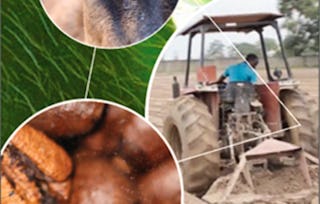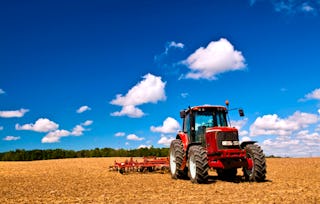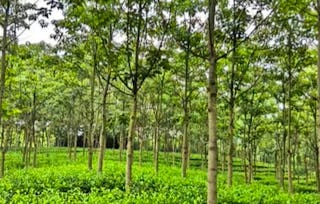The Discover Best Practice Farming for a Sustainable 2050 Course is based on a clear vision: imagine best practice farming for 2050, start to implement these strategies now, all the while making sure it will still be profitable. At UWA we're doing just that with the Future Farm 2050 Project, set on a mixed-enterprise farm in Western Australia and we want you to learn how it can be done in your part of the world.

Discover Best Practice Farming for a Sustainable 2050
3 days left! Gain next-level skills with Coursera Plus for $199 (regularly $399). Save now.

Discover Best Practice Farming for a Sustainable 2050

Instructor: Graeme Martin
45,648 already enrolled
Included with
(756 reviews)
Skills you'll gain
Details to know

Add to your LinkedIn profile
9 assignments
See how employees at top companies are mastering in-demand skills

There are 7 modules in this course
Welcome to "Discover Best Practice Farming for a Sustainable 2050". In this first week you'll be introduced to the UWA Future Farm 2050 Project, an initiative by UWA in agricultural R&D and regional engagement. The project is centred on agriculture but you'll discover that feeding the world needs a mutli-disciplinary approach, and there are a wide range of issues confronting the agricultural industry which must be addressed if we are to cope with population projections for 2050.
What's included
3 videos1 reading1 assignment
Welcome to the second week of "Discover Best Practice Farming for a Sustainable 2050". This week you will gain an understanding into the importance of soil and water and its careful management.
What's included
4 videos2 readings2 assignments
Welcome to Week 3 of "Discover Best Practice Farming for a Sustainable 2050". This week you'll be introduced to Ecological Cropping, and more specifically weed management and plant breeding. Effective weed management strategies, in a changing environment with increasing resistance to herbicides, has become increasingly important for crop management. In addition to these management strategies, successful cropping also depends on high yielding varieties, tolerant to a changing environment.
What's included
6 videos1 reading1 assignment
Welcome to Week 4 of "Discover Best Practice Farming for a Sustainable 2050". This week you'll be introduced to Versatile Livestock Systems. You'll learn about the about the principles of "Clean, Green and Ethical" livestock management. This is the driving livestock management principle of the Future Farm 2050 Project. You'll also understand the risks associated with livestock production in drylands, working towards versatile systems and managing the relationship between animals and the environment.
What's included
2 videos1 reading1 assignment
Welcome to Week 5 of "Discover Best Practice Farming for a Sustainable 2050". This week you'll be introduced to Conservation of Biodiversity in Agriculture. You will learn about biodiversity hotpots, the impacts of clearing land for agriculture and our reliance of healthy ecosystems (ecosystems services) for survival. You will also learn about site and re vegetation planning and the integration of biodiversity into farming systems.
What's included
2 videos1 reading1 assignment
Welcome to Week 6 of "Discover Best Practice Farming for a Sustainable 2050". This week you'll be introduced to the importance of People and Infrastructure for sustainable agriculture. People in regional areas face many different challenges to those residing in urban areas. The changing environment has further increased these challenges. In addition, infrastructure in regional areas is expensive to build and often not "Fit for Purpose"
What's included
4 videos2 readings2 assignments
Congratulations! You've reached the end of "Discover Best Practice Farming for a Sustainable 2050"
What's included
1 video1 assignment
Instructor

Offered by
Explore more from Basic Science
 Status: Preview
Status: PreviewUniversity of Copenhagen
 Status: Preview
Status: PreviewUniversity of Florida
 Status: Free Trial
Status: Free TrialUniversity of Illinois Urbana-Champaign
 Status: Free Trial
Status: Free TrialUniversity of Florida
Why people choose Coursera for their career

Felipe M.

Jennifer J.

Larry W.

Chaitanya A.
Learner reviews
- 5 stars
75.13%
- 4 stars
19.57%
- 3 stars
3.17%
- 2 stars
1.32%
- 1 star
0.79%
Showing 3 of 756
Reviewed on Oct 3, 2020
The Pedagogy is really simple and easy to follow. The information and knowledge from the course is very insightful and look forward to pursuing further courses
Reviewed on Jul 26, 2020
Its really interesting knowledgeable course, to cope with the increasing demand for food production to support the growing population. In a different & renewed way.
Reviewed on Dec 2, 2021
The information was truly enlightening! I look forward to use the knowledge that I have gained and use it in the process of designing my future home and farm.

Open new doors with Coursera Plus
Unlimited access to 10,000+ world-class courses, hands-on projects, and job-ready certificate programs - all included in your subscription
Advance your career with an online degree
Earn a degree from world-class universities - 100% online
Join over 3,400 global companies that choose Coursera for Business
Upskill your employees to excel in the digital economy
Frequently asked questions
To access the course materials, assignments and to earn a Certificate, you will need to purchase the Certificate experience when you enroll in a course. You can try a Free Trial instead, or apply for Financial Aid. The course may offer 'Full Course, No Certificate' instead. This option lets you see all course materials, submit required assessments, and get a final grade. This also means that you will not be able to purchase a Certificate experience.
When you purchase a Certificate you get access to all course materials, including graded assignments. Upon completing the course, your electronic Certificate will be added to your Accomplishments page - from there, you can print your Certificate or add it to your LinkedIn profile.
Yes. In select learning programs, you can apply for financial aid or a scholarship if you can’t afford the enrollment fee. If fin aid or scholarship is available for your learning program selection, you’ll find a link to apply on the description page.
More questions
Financial aid available,

